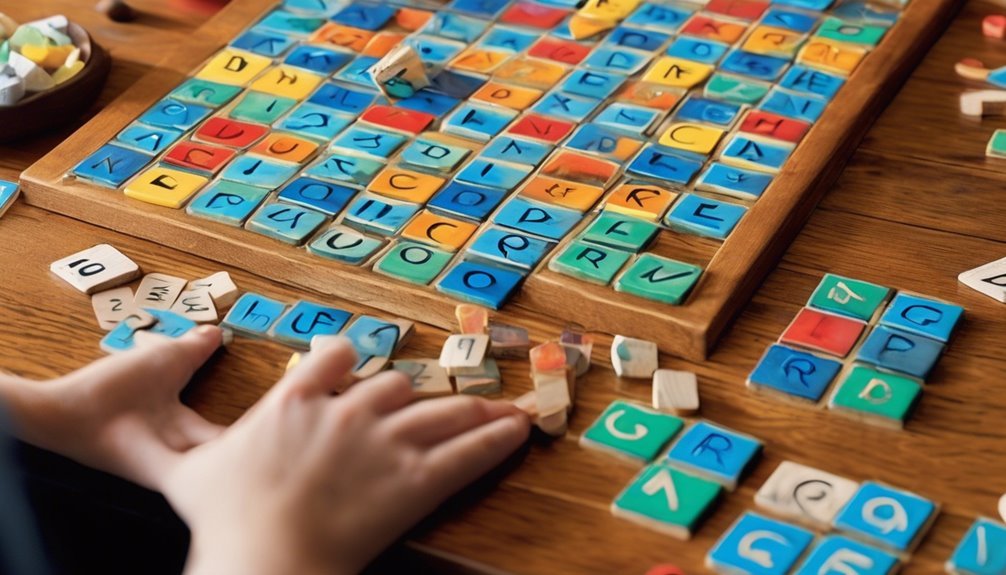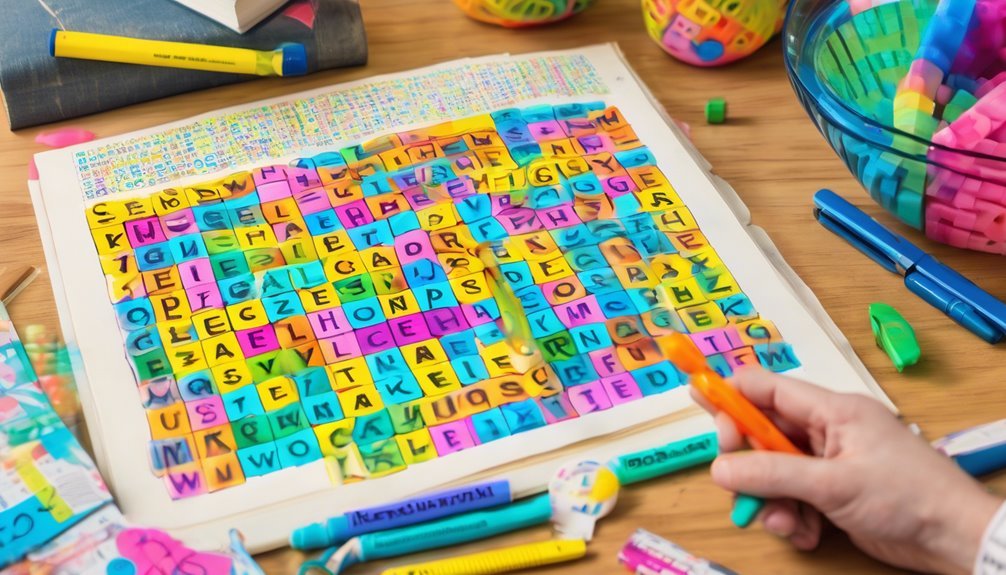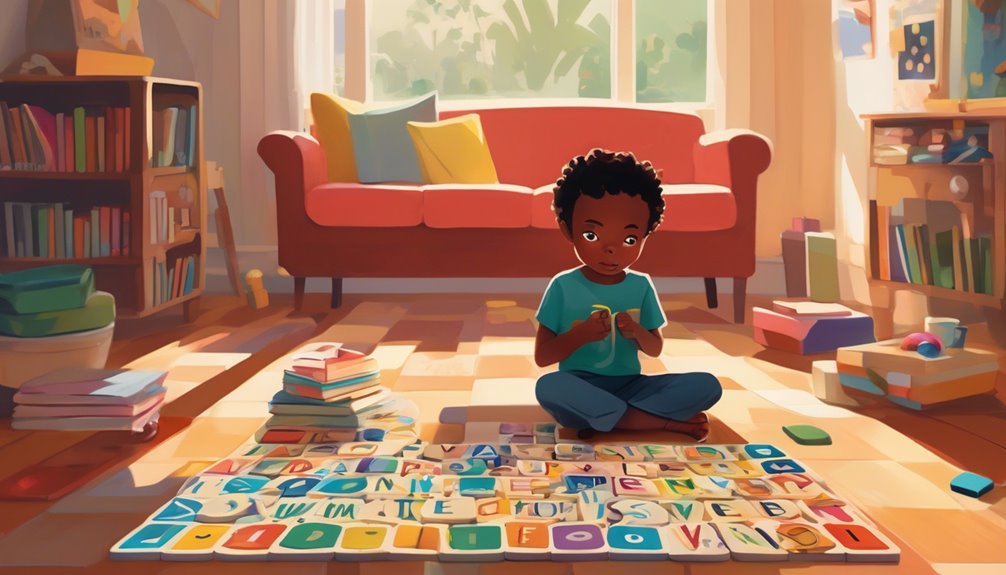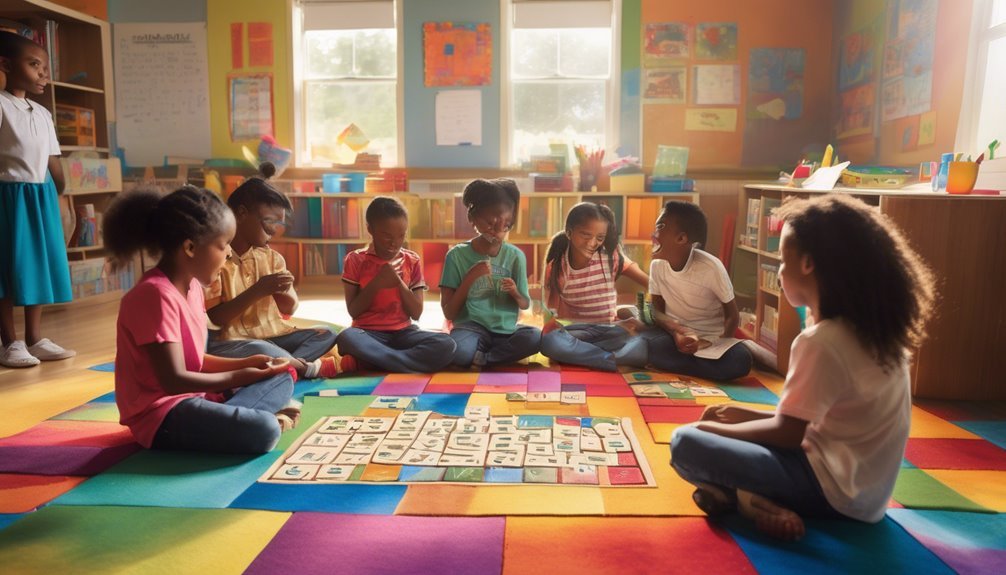Supporting Spelling Skills Through Word Games
Did you know that word games can significantly boost children’s spelling skills while keeping them engaged? These playful activities not only enhance vocabulary but also spark curiosity and critical thinking. As you explore various types of games, you’ll discover effective ways to make spelling practice enjoyable and beneficial. Curious about how to implement these strategies at home? Let’s take a closer look at the potential of word games in supporting spelling development.
Key Takeaways
- Word games make spelling practice enjoyable, fostering a love for language and enhancing engagement in learning.
- Classic games like Scrabble and Boggle challenge vocabulary skills while promoting creativity in word formation.
- Crossword puzzles reinforce spelling knowledge through interactive problem-solving and critical thinking.
- Regularly incorporating various word games builds a routine that strengthens vocabulary and spelling skills over time.
- Phonetic games like Hangman focus on sound-letter connections, enhancing phonemic awareness and spelling accuracy.
The Importance of Spelling Skills in Early Education

While you mightn’t realize it, spelling skills play a crucial role in early education. They’re not just about memorizing letters; they’re foundational to reading, writing, and communication.
When you support a child’s spelling journey, you’re giving them tools to express their thoughts and ideas clearly. This ability enhances their confidence in school and beyond.
As they learn to spell, they also grasp the connection between sounds and letters, which fosters phonemic awareness. This understanding can spark a love for reading, making learning more enjoyable.
You’ll see them take pride in their work as they become more proficient. Nurturing these skills early on sets the stage for lifelong learning, opening doors to new opportunities and experiences.
Benefits of Using Word Games for Spelling Practice
Engaging in word games not only makes spelling practice fun, but it also enhances a child’s learning experience.
When you play word games, you create a relaxed atmosphere where your child feels more comfortable exploring new words. This playful approach encourages curiosity and boosts confidence, enabling them to tackle challenging spellings without fear.
Plus, word games sharpen critical thinking and memory skills, making them more effective learners overall. You’ll notice that as they play, they’re not just memorizing; they’re connecting letters to sounds and meanings, deepening their understanding.
By incorporating these games into your routine, you’re not just helping with spelling; you’re fostering a love for language that can last a lifetime.
Types of Word Games to Enhance Spelling

Word games come in many forms, each offering unique ways to boost spelling skills. You can dive into classic games like Scrabble, where you’ll not only form words but also challenge your vocabulary.
Another fun option is Boggle, which encourages quick thinking as you search for words in a jumble of letters. If you enjoy a bit of competition, try word search puzzles; they sharpen your recognition of spelling patterns.
Additionally, phonetic games like Hangman can help you focus on the sounds of letters, reinforcing your understanding of spelling. By mixing these games into your routine, you’ll make spelling practice enjoyable and engaging, turning learning into a delightful adventure.
Incorporating Crossword Puzzles Into Learning
Crossword puzzles are another fantastic tool for enhancing spelling skills in a fun and interactive way. As you fill in the blanks, you’re not just guessing letters; you’re engaging your mind and reinforcing your spelling knowledge. Here’s a glimpse of how they can evoke joy:
| Emotion | Experience |
|---|---|
| Excitement | Solving a challenging clue |
| Satisfaction | Completing the puzzle |
| Connection | Sharing with a friend |
| Achievement | Mastering new words |
Engaging With Word Searches for Vocabulary Building

While you might think of word searches as simple puzzles, they actually serve as powerful tools for building vocabulary and reinforcing spelling skills. As you search for words, you engage your brain in a fun, interactive way, making the learning process enjoyable. Each time you spot a word, you deepen your understanding of its spelling and meaning.
Try creating themed word searches around topics you’re interested in; this not only enhances your vocabulary but also keeps you motivated. You can even challenge friends or family to solve them together, turning a solitary activity into a shared experience.
Online Spelling Competitions: A Modern Approach
As technology continues to shape how we learn, online spelling competitions have emerged as an innovative way to sharpen your spelling skills.
These competitions not only make learning fun but also connect you with others who share your passion.
Here are three benefits of joining these online events:
- Interactive Learning: You’ll engage in real-time challenges that motivate you to improve.
- Community Support: Competing alongside others fosters camaraderie and encouragement, making spelling a shared journey.
- Flexible Participation: You can join from anywhere, fitting competitions into your busy schedule.
Creating a Word Game Routine at Home

Building on the excitement of online spelling competitions, creating a word game routine at home can further enhance your spelling skills. Engaging in word games regularly not only makes learning fun but also strengthens your grasp of vocabulary. Here’s a simple routine to get started:
| Day | Game Type | Duration |
|---|---|---|
| Monday | Scrabble | 30 mins |
| Tuesday | Hangman | 20 mins |
| Wednesday | Word Search | 25 mins |
| Thursday | Crossword Puzzle | 30 mins |
| Friday | Boggle | 15 mins |
Tailoring Word Games for Different Learning Styles
Understanding that each learner has unique preferences can significantly enhance the effectiveness of word games in developing spelling skills. By tailoring these games to fit different learning styles, you can make the experience more engaging and productive.
Here are three ways to customize word games for various learners:
- Visual Learners: Incorporate colorful flashcards and graphic organizers to help them visualize words and their meanings.
- Auditory Learners: Use rhymes or songs, turning spelling into a fun auditory activity that sticks in their minds.
- Kinesthetic Learners: Engage them with hands-on activities, like building words with letter blocks or using movement-based games.
Success Stories: Real-Life Examples of Improvement Through Word Games

Word games have transformed the spelling journey for many learners, turning challenges into triumphs.
Take Emily, for instance. After struggling with spelling for years, she discovered word puzzles that made learning enjoyable. In just a few months, her confidence soared as she tackled words she once found daunting.
Then there’s Jake, who used competitive spelling games to spark his interest. He went from dreading spelling tests to eagerly practicing every day, and his grades improved dramatically.
These stories show how word games can create a supportive environment where learners thrive. By engaging with words playfully, you can unlock your potential, just like Emily and Jake did.
Frequently Asked Questions
How Often Should Children Play Word Games for Best Results?
You should encourage kids to play word games regularly, ideally a few times a week. Short, frequent sessions keep them engaged and help reinforce their learning without overwhelming them—making it fun and effective.
What Age Is Appropriate to Start Word Games for Spelling?
Imagine your child diving into a world of letters at age four. That’s when you can start introducing word games. It’s a playful journey, sparking curiosity and building confidence in their spelling skills.
Are There Any Specific Word Games for Dyslexic Learners?
Absolutely! Try games like Boggle or Scrabble, which let you explore words creatively. You can also use apps designed for dyslexic learners, making it fun and engaging while building confidence in their spelling skills.
How Can Parents Track Progress in Spelling Skills?
Did you know that children can improve spelling skills by 20% with consistent practice? You can track progress by keeping a simple journal, noting daily successes and challenges, and celebrating small milestones together to boost confidence.
Can Word Games Be Used for Non-Native English Speakers?
Absolutely, word games can enhance your language skills! They’re fun, interactive, and help you grasp vocabulary and pronunciation. You’ll find yourself learning naturally, enjoying the process while building confidence in your English abilities.
Conclusion
By weaving word games into your child’s routine, you’re not just enhancing their spelling skills; you’re opening the door to a world of language and creativity. These playful activities transform learning into an adventure, making it a delightful experience rather than a chore. So, embrace the joy of spelling through games, and watch as your child flourishes in their literacy journey. After all, who wouldn’t prefer a fun challenge over a tedious drill? Let the games begin!








